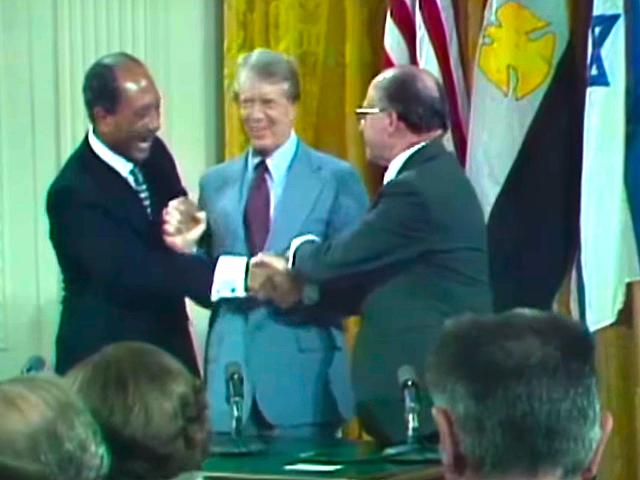In a dramatic interview aired on BBC Arabic in May, Tarek El Khouly, Deputy Chairman of the Egyptian House of Representatives’ Foreign Relations Committee, made a striking assertion that Egypt's peace with Israel, a treaty over 40 years old, was purely a strategic maneuver to reclaim Egyptian territory. He ominously hinted that recent tensions between the two nations could lead to a downgrading of their relations, asserting that all options remain on the table, albeit to be played out gradually as superpowers do.
The peace treaty between Israel and Egypt, signed in 1979, marked the end of decades of hostilities, including several wars. This historic accord saw Israel returning the Sinai Peninsula, which it had occupied since the 1967 Six-Day War. In exchange, Israel gained a crucial Arab ally and a more secure southern border. The treaty also paved the way for significantly improved US-Egypt relations, resulting in Egypt receiving over $1 billion annually in US aid—a financial lifeline for the Egyptian government.
Egyptian Foreign Relations Official Tarek El Khouly: Peace with Israel Was a Political Maneuver to Regain Our Lands; Downgrading Our Relations with Israel Is Plausible, All Option Are on the Table #Egypt #Israel pic.twitter.com/wu3i8bvJOC
— MEMRI (@MEMRIReports) June 9, 2024
Egypt's decision to be the first Arab state to recognize Israel in 1979 was monumental, setting a precedent that Jordan followed in 1994, and later, the United Arab Emirates, Bahrain, Morocco, and Sudan in 2020. Over 45 years, Israel and Egypt have cultivated economic, military, and political cooperation. Trade flourished, with Israelis visiting Egypt in droves, and the two nations collaborating on security measures against terrorism in Sinai. Notably, in 2018, Egypt signed a $15 billion gas import deal with an Israeli company, highlighting the economic interdependence.
Egypt is the 3rd largest recipient of US foreign aid.
— ⓘ Dogs don't have thumbs (@MorlockP) June 8, 2024
(During the Cold War, they were massive recipients of Soviet foreign aid.)
Egyptians have two core competencies:
(a) cashing checks from superpowers
(b) showing off monuments built by the people their ancestors killed https://t.co/p6s3tRdNXy
Despite these mutual benefits, the relationship has been fraught with tension, primarily due to the ongoing conflict in Gaza. Many Egyptians harbor deep-seated animosity towards Israel, influenced by religious and historical narratives. The Muslim Brotherhood, which gave rise to Hamas, was founded in Egypt and remains influential despite being banned. This ideological backdrop complicates Egypt's diplomatic stance.
Economic ties have persisted despite political strains, as noted by Haisam Hassanein from the Washington-based Foundation for Defense of Democracies. Israeli fuel flows into Egypt, and both nations maintain their water-sharing agreement, underscoring a pragmatic approach to mutual necessities.
To incentivize Cairo to change its policy, Washington should make it clear that Cairo could become the key interlocutor if it starts acting responsibly, and can expect to be marginalized if it doesn’t.
— FDD (@FDD) June 6, 2024
More here from @HaisamHassanei1:https://t.co/TgZlXD4BCE
The Israel-Hamas conflict has exacerbated tensions, with accusations flying over Israel's alleged attempts to push Gazans into Egypt's Sinai Peninsula. Egypt has steadfastly refused to accept Gazan refugees, citing national security concerns and the potential destabilization of its already fragile economy. Nourhan N. Moussa, a Cairo-based international lawyer, emphasized Egypt's right to defend its borders, pointing to measures like physical barriers and the destruction of tunnels used for smuggling over a decade ago after Gaza militants infiltrated Egypt and slaughtered soldiers.
The closure of the Rafah border crossing, a critical entry point for humanitarian aid into Gaza, has further strained relations. Both Israel and Egypt blame each other for the impasse, with Egypt denying the existence of terror tunnels despite overwhelming proof of their existence. Some political analysts have suggested that corrupt elements within the Egyptian government profit from the smuggling operations, levying tariffs and earning percentages of the goods brought into the Strip via these tunnels - some of which are as wide as a two lane highway.
Israel has a policy of flooding Gaza with aid, even after Gaza flooded Israel with terrorists.
— Eylon Levy (@EylonALevy) May 23, 2024
Egypt is blocking aid, Hamas is hijacking it, and the UN is covering it up. They must be held accountable.
From today's @IsrCitizenSpox daily briefing. Follow us. pic.twitter.com/CZQEWWj0Dn
El Khouly's candid remarks underscore the precarious nature of the peace treaty, hinting at Egypt's strategic motivations and the complexities of its relationship with Israel. While some Egyptian leaders might contemplate severing ties, analysts widely agree that the economic and security costs would be prohibitive. The peace deal, though fraught with challenges, remains a cornerstone of regional stability, with Egypt unlikely to forsake its benefits in the foreseeable future.


